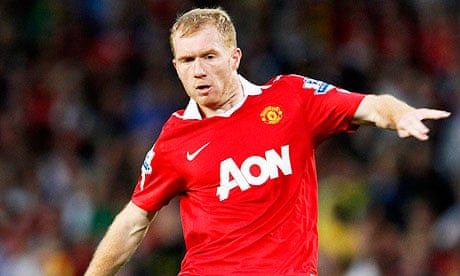He played for one of the most renowned of all clubs but Paul Scholes was also turning out for underdogs everywhere. There is always a joy when a 5ft 7in midfielder has the nimbleness and timing to confound a beefy defence and score with a header. We will see no more of that from him now that he has retired and agreed to move on to the Manchester United coaching staff.
Scholes has made his decision not a moment too soon, but he still displayed the sort of precise timing that so often made him a lethal arrival in the opposition's penalty area. The 36-year-old has 10 Premier League winners' medals yet it is good to see him go because there was a pathos in witnessing him being downgraded to a substitute.
He had to come off the bench at Blackburn Rovers to be part of the draw that made United champions this year. Scholes was employed simply as a replacement, too, when his side lost the Champions League final at Wembley. Some would argue that he should have stood down sooner, but he was entitled to a gradual departure after offering so much for so long.
It is one of the glories of football that a scrawny and diminutive youngster with asthma can become a titan. Scholes moved people with the incongruity of his achievements as much as the impact of his play. He had emerged well before the period when sports science could help take, say, Lionel Messi from being a boy with growth-hormone deficiencies to a terror of a centre-forward.
While knowhow will have done Scholes some good as well, the vigour to put himself amongst the elite was drawn most of all from his own character. He has declared on 150 goals for United, but no matter how often he scored any sympathetic onlooker went on feeling a jolt of glee at the sight of him getting the better of bigger and ruthless opponents.
That helps explain the scale of the accolades since the grandees of the sport are as beguiled as anyone else. Zinedine Zidane has called him "the greatest of his generation". Xavi hailed him as "the best central midfielder of the past 15 or 20 years". The superlatives, it ought to be admitted, are unwarranted. Scholes, for instance, was never to find his way into the top three when the world player of the year award was decided.
It would probably not have occurred to him that he should have been in the running. He is a throwback of a kind, with an allegiance to a locality from which he drew strength. Scholes was one of the very few outstanding footballers who made you certain that the bonds to place and club were indissoluble. That instinct ran much too deep, all the same, when Scholes's outlook diminished his worth in other contexts.
He had not even turned 30 when he retired from the international scene in 2004, yet the blame for that is not his alone. Efforts to woo him came far too late for an individual who was not cherished enough while he was turning out for his England. It is dismaying to recall the blinkered commitment to 4-4-2 that saw Sven-Goran Eriksson shunt Scholes to the left at Euro 2004 because, given his fixation with a flat four in midfield, there were only two places in the centre, reserved for Frank Lampard and Steven Gerrard.
There were no recriminations and Scholes did imply that it might have been a mistake not to return to the international scene when the invitation was extended by Fabio Capello before the 2010 World Cup. That overture from the England manager was both a tribute to the midfielder and a confession that the country had no one in their prime who could stand comparison with him. With luck Jack Wilshere will take on such status, but the wait for even the vaguest successor to Scholes has been protracted.
The prowess of the United player lay as much in the mind as in his technique. There was a quick-witted audacity to the best of his passes and goals. He had seen both the opening and the perfect way to exploit it while defenders were still oblivious to the danger. Scholes, too, had a streak of nastiness.
He was pardoned too often for dangerous tackles, with apologists declaring that he was not skilled in that aspect of the sport. They were right, but Scholes seldom let his limitations stop him from hurtling into an opponent.
He had a blazing imagination but the aggression was searing as well. Perhaps he needed both those traits to put himself among the elite. Scholes now enters coaching, but it is most unlikely that he will ever develop a footballer quite like his own, remarkable self.
